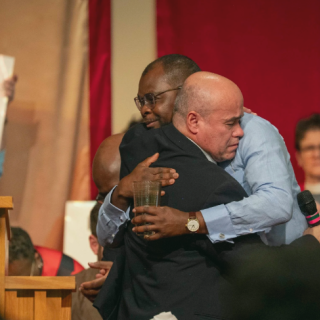Advertisement
Six months in, the Civilian Police Review Board has not yet begun their work.
Over twenty years after citizens of Columbus began asking for a civilian board to monitor the actions of the Columbus Division of Police, they overwhelmingly voted in favor of creating this body in November 2020. The first 11-member board was appointed by Mayor Andrew Ginther and approved by Columbus City Council in July of 2021.
The Civilian Police Review Board or CPRB has two jobs: to hire and supervise an Inspector General (IG), and to serve as a standing administrative jury hearing cases investigated by the Inspector General.
Neither has happened yet.
At the first meeting of the CPRB in August 2021, Chair Janet Jackson expressed a hope that they would hire the IG by December. But during this month’s meeting (January 4, 2022) the topic was not on the agenda. Jackson, who was appointed Chair by Mayor Ginther, brought it up at the very end of the three-hour meeting, seemingly as an afterthought.
Looking around the room at the CPRB she said,“So I’m sure you’re curious as to where we are in the whole hiring process of the Inspector General. I will share this with you…The process is moving along. I am comfortable with it. We’re getting close. OK?”
No board members asked any follow up questions.
A public job posting in October attracted 27 applicants for IG, according to a Mayor’s Office spokesperson, but only 19 followed the instructions to submit their resume by Nov 22 to Robert Burg of Ralph Andersen & Associates from California, according to one of the applicants who wished to remain unnamed for this story. Robert Burg has declined to comment for this story.
Burg told the unnamed applicant he was asked to give the CPRB a “short list” of 12 IG applicants by Dec 15th. He forwarded 13 applicants, which included one of the applicants who didn’t follow through with specific instructions to send her resume to the recruiter by the stated deadline.
The applicant who failed to send her resume in by the deadline is DiMaris Medina-Cortes, a part-time sworn officer employed by two Central Ohio police departments and a full-time fraud investigator with the Ohio Attorney General’s office.
Medina-Cortes was initially appointed to the CPRB to replace Randall Sistrunk who had resigned, but she only lasted for one month because her employer, Attorney General Dave Yost, told her it was a conflict of interest and she needed to resign, stated Jackson when Medina-Cortes was absent at the next meeting. She complied with Yost’s request and then applied for IG but didn’t follow the instructions to forward her resume to Burg by the deadline.
An ad hoc interview committee of CPRB members Brooke Burns, Mark Fluharty, Willard McIntosh, Jr., and Kyle Strickland is reportedly working to narrow the IG list of 13 down to 2 or 3, according to a Mayor’s Office spokesperson. But at the January 4th meeting of the CPRB, that committee offered no report. No committee members have confirmed that they are involved in the process.
Instead Jackson, again speaking to the CPRB on Jan 4, said, “I would say that during the second or third week of January you will receive notice from [the CPRB’s administrative assistant] Colleen, but this will be broadly publicized to the community, there will be a virtual meeting of probably what will be two or three candidates.”
But then she offered a confusing warning to the CPRB members:
Jackson’s reasoning was it would be probable that more than six of the members would attend that Zoom event, causing it to fall under the open meeting laws. She assured them that they would all be able to interview the two or three candidates in person at a later date.
Hiring the Inspector General is one of the Civilian Police Review Board’s only two jobs. The voters delegated this task to them. Why then is it important for this event to be shielded from open meeting laws?
Jackson is avoiding the press and the public
During the last six months Jackson has taken numerous actions to reduce the number of public meetings and taken steps to keep the public physically out of the six meetings of the full CPRB that were actually open meetings.
At the first CPRB meeting back in August, which included a Public Meeting 101 lecture from Asst. City Attorney Lara Baker-Morrish, open meeting laws were violated by not letting anyone, including Mayor’s Office staffers, know when and where the meeting would be held.
The next month Jackson instructed security guards to only allow an approved attendance list into the meeting.
She also broke up the required training for CPRB members at the police academy into small groups so they would not become public meetings.
Jackson lamented that she wouldn’t be able to attend the meetings of the CPRB’s subcommittees with five members because her attendance would make them public.
In November, they moved the meeting to a building with no access without a City ID.
And last month’s meeting the Mayor’s website initially implied the press and the public could only watch on YouTube, in violation of state law.
Janet Jackson, in many ways, has a pro-police background which has led her to chairing the CPRB. Jackson spent four years working for the Ohio Attorney General’s office in the 1980s before serving nearly a decade as a Franklin County Municipal Court judge, the first African American female judge in Franklin County history. Jackon’s prominence continued, becoming the first woman and African American to be elected Columbus City Attorney (1997 to 2003).
As City Attorney, Jackson was a member of City leadership when the Department of Justice filed suit against Columbus and its police for pattern and practice violations at the end of the 1990s. She successfully fought to prevent a consent decree being issued by the federal court, a fact that the Columbus police culture still brags about.
More recently she was picked in 2017 by Ginther to chair the Mayor’s Community Safety Advisory Commission, which was tasked to study Columbus police use of force policies and seek greater diversity within the Division. The political will to establish a civilian review board gained traction when this commission made it one of their 80 recommendations. Two of the CPRB members, Brooke Burns and Chenelle Jones, also served on that commission, which disbanded in 2019. Burns was added to the CPRB when the community expressed concern that the original nine selected by Ginther did not have strong enough connections to the Black neighborhoods that experience over policing. She was then hand-picked by Jackson to serve as vice chair of the CPRB, presumably to then follow Jackson as chair.
The CPRB completed its bylaws, which are available here.
They have had long debates about how their individual social media activities could impact the work of the CPRB.
Each of the members has submitted to hours of training/indoctrination by supervisors of the same police department they are seated to judge. The CPRB’s Training Committee reported that they are organizing their requests for ongoing training, including the legal updates that are provided to the officers.
CPRB member Aaron Thomas, who directs OSU’s College of Medicine’s ASPIRE program, wondered aloud at an early meeting if it is important to experience the world from a police perspective, is it not equally or more important to experience the world from an overpoliced resident perspective?
That training hasn’t been scheduled. The Training Sub-committee, chaired by Jones, did report at the January meeting that they are working on a timetable for training new and existing members of the CPRB, including that they would like ongoing updates from the Division legal staff.
All six meetings are available to view at the city’s Keeping Columbus Safe playlist on their YouTube channel https://www.youtube.com/playlist?list=PLDzGbueVklj2l1ByQwKsALwrOtam2QdPN.
The board’s calendar and other resources are available at https://www.columbus.gov/civilianpolicereviewboard/.
What to expect in the coming months
With any luck, an Inspector General will be hired in February. The IG will then need to hire their staff and establish their policies and procedures. If the process we have witnessed so far is any guide, it will likely be late spring or early summer before they can begin conducting investigations.
When this hiring is completed, the CPRB can then begin their second job of hearing cases. They will be recommending disciplinary actions and possibly policy changes with the Division based on their review of the cases brought before them.
With the restrictions put on the IG and the CPRB, most requested by the Fraternal Order of Police, many do not expect that substantive change will come from this process.
The first six months of their work has done nothing to contradict this expectation.



